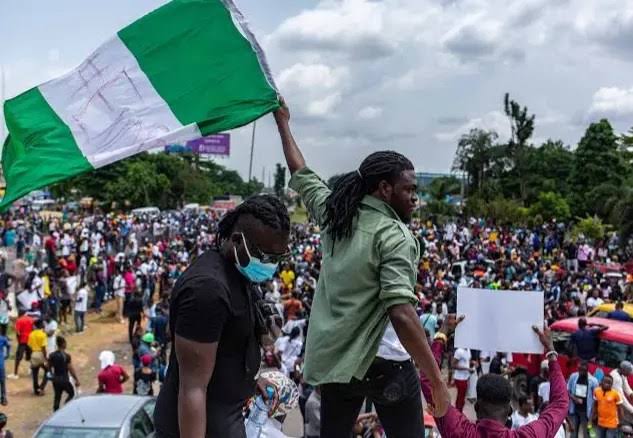Is protesting a democratic act? Criticizing Nigeria’s repression

Photo of Nigerian youths protesting in the #EndBadGovernance protest of 2024. Photo Credit- Premium Times
In Nigeria, the question of whether protesting is a democratic act often feels less like a philosophical debate and more like a survival test. On March 25, 2025, Chief Nubari Saatah, President of the Niger Delta Congress (NDC), was arrested in Port Harcourt, detained at the State Criminal Investigation Department, over plans for a peaceful demonstration against President Bola Tinubu’s emergency rule in Rivers State.
This incident, coupled with the police summoning NDC spokesperson Mudiaga Ogboru has shown a spotlight on a recurring pattern: the government’s swift clampdown on dissent, either before protests ignite or as they unfold. From the #EndSARS uprising of 2020 to the “End Bad Governance” rallies of 2024, arrests have shadowed Nigeria’s protest landscape, raising a critical question: If protesting is a cornerstone of democracy, why does it so often end in handcuffs and court litigations here?
How protesting is a constitutional right
At its core, protesting is part of democracy; a raw expression of the citizens’ will. Nigeria’s 1999 Constitution, under Section 40, enshrines this, guaranteeing every citizen “the right to assemble freely and associate with other persons,” even imitating the global democratic norms, where citizens hold individuals who have been given the power to run the affairs of the state to account for such power use through peaceful marches, placards, and chants. The NDC’s call to protest Tinubu’s March 18 emergency declaration, which is suspending Governor Siminalayi Fubara, his deputy, and the Rivers State Assembly, is a clear example of exercising this right. Their grievance is a perceived “undemocratic rule” with Vice Admiral Ibok-Ete Ibas’s appointment as sole administrator, a move certified by the National Assembly but kicked against by groups like PANDEF.
In theory, this is democracy at work: a socio-political group mobilizing to challenge executive order, as the NDC’s March 23 statement demanded Fubara’s reinstatement and dialogue over compulsory suspension. The arrest of Saatah before a single banner was raised suggests not just a preemptive strike but a rejection of this democratic tenet. Permit me to ask this rhetorical question; If citizens can’t even plan to protest without facing detention, is the right real, or just ink on paper?
READ ALSO
Rivers State: Criticizing Tinubu’s state of emergency, way forward
Rivers crisis: Suggestions for sustainable peace
Arrests as the Nigerian way of repression
Nigeria’s history tells a darker tale. The 2020 #EndSARS protests, sparked by police brutality, saw peaceful demonstrators met with tear gas and live bullets in the Lekki Toll Gate massacre, where at least 12 died, per Amnesty International. Fast forward to August 2024’s “End Bad Governance” protests: 14 killed across states, scores arrested, and curfews imposed as police fired live rounds. Now, Saatah’s detention, just hours after Ogboru’s dual invitations from Lagos and Rivers police commands, shows a continuous pattern of repression.
What is the charge? Someone may ask. It is planning a protest deemed disruptive, despite its stated peacefulness and lack of a specific ban under the emergency rule.Section 45 of the Constitution allows rights restrictions during emergencies “in the interest of public safety and national security,” but there is a flaw with such principle. Tinubu’s March 18 broadcast cited a “near-total collapse of governance” in Rivers, yet no evidence links the NDC’s planned action to violence. Amnesty International’s March 26 condemnation labeled Saatah’s arrest “arbitrary and unlawful,” a sentiment echoing on social media, where users insistently lamented Tinubu’s “disregard for peaceful protest.” The police’s release of Saatah on March 26, after TakeItBack Movement’s intervention and an undertaking to notify authorities of future protests, feels less like a concession and more like a leash, an unstable democracy.
Democracy or dictatorship in disguise?
Protesting’s democratic badge shines brightest when it’s free from state strangulation. In Nigeria, arrests; whether before the start, as with Saatah, or during as with #EndSARS, only shows a government more comfortable with control than dialogue. The Rivers emergency rule, sparked by the Wike-Fubara feud and pipeline blasts, might justify security measures, but silencing dissent before it speaks crosses into authoritarian terrain. Compare this to the U.S., where 2020’s Black Lives Matter marches faced police pushback but had no significant repression from the government in form of detention either before the start or during the protest, or Kenya’s 2024 anti-tax protests, though met with violence was still upheld as a right by courts.
Know that the NDC case is just a micro aspect of the situation: a group exercising Section 40, only to be choked before starting. Saatah’s arrest, Ogboru’s summons, and the lack of clarity on legal grounds (beyond “fact-finding”) expose a system where power is against participation. If protesting is democratic, Nigeria’s version feels like a mirage, though promised but perpetually out of reach.
Conclusion
Let me conclude that protesting is inherently democratic but is undermined in Nigeria by the frequent arrests of protesters. I used the examples of Saatah, #EndSARS, and other instances to argue that the government’s actions are not protective but suppressive of democratic rights, suggesting that democracy in Nigeria is more of an illusion than a reality.

